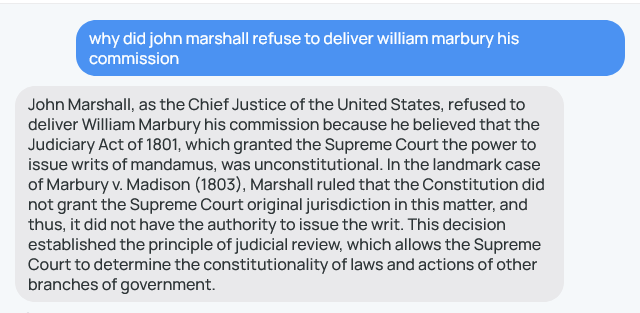The Flawed Cornerstone: The Foundation Of American Democracy
Making Good Use Of Imperfect People Is America's Recurring Theme
The stone which the builders rejected
has become the head of the corner.
This is the Lord’s doing;
it is marvelous in our eyes.
As a rule, I prefer to avoid invoking Scripture within this Substack. I have two principal reasons for this:
1) I have another substack, Peter’s Proverbs, where I explore the meanings I find within Bible verse.
2) The intent of this Substack is always to be grounded within actual empirical fact—that which can be documented and attested to. The Bible stands as a repository of profound spiritual and moral truth, but its teachings, being spiritual and moral, are by definition not “factual.”
However, whenever we explore the ramifications of various facts, we invariably encounter premises, predicates, and presumptions which can only be described as “moral”. How we interpret a fact largely hinges upon our pre-existing biases. Recognizing that, there is an important political truth we can derive from Psalm 118, a truth which stands irrespective of one’s particular religious faith or inclinations.
It is important we realize this, particularly during an election year, because many of the facts with which we must contend must be assessed within the context of the candidates in the race for elective office. We are confronted not just with the words people have said, but the people themselves. We must assess their words within our overall understanding of the person, and our own predisposition towards that person.
We see this play out with many of Donald Trump’s off-the-cuff (and, let’s be honest, frequently off the wall) statements, such as his recent appeal to a gathering of Christian conservative voters to get out and vote, saying “you won’t have to vote again”.
Rather predictably, progressives and liberals (but I repeat myself) went into full pearl-clutching mode over the language, as their obligatory virtue-signalling tweets demonstrate.
However, a full hearing of the passage opens up another take on Trump’s language, as does hearing and watching the video of his address.
And again, Christians, get out and VOTE! Just this time. You won't have to do it any more. Four more year...you know what? It'll be fixed, it'll be fine, you won't have to vote any more my beautiful Christians, I love you Christians. I'm a Christian. I love you. Get out...you got to get out and vote. In four years you don't have to vote again, we'll have it fixed so good you're not going to have to vote
Is this a subtle dig at democracy, as those on the left argue?
Looking strictly at the words themselves, one has to admit that interpretation is not wholly irrational. Yet the overall phrasing, coupled with Trump’s tone of voice and body language, also suggests another interpretation which is quite benign and even optimistic. Specifically, the argument can easily be made that Trump is making an appeal to Christian conservative voters to make an especial commitment to turn out and vote in this election, a commitment he is seeking only for the 2024 election. It is an appeal and even a promise that, should this voting block reward him with their vote, he will not return to them in 2028, hat in hand, needing to press them into a concerted campaign in that election cycle, or indeed any election cycle.
While the probable meaning is absolutely benign and even hopeful, the words themselves are clumsy at best, problematic at worst. Given Donald Trump’s prior term of office, charges that Trump intends to put in place an enabling act, vis-a-vis the Third Reich are simply not realistic interpretations of what he said. Trump is many things, and not all of them are good, but the one thing he has not been is a megalomaniacal dictator wannabe. Putting that interpretation on his words is simply not realistic.
Does that mean he should not be criticized for having used such language? Not at all. The language is artless and clumsy and can easiliy be taken in problematic directions at a minimum. At a minimum, he has left himself open to criticisms he did not need to endure. He has invited progressive anti-Trump memes which were never necessary.
However, we should be mindful that even the most eloquent voices in our country’s history have been flawed, complex, complicated characters. Their signature stances and pivotal moments were not the simplistic narratives we see commonly presented in the media.
Take, for example, the famous Marbury v Madison Supreme Court case1, where Chief Justice John Marshall deftly threaded the needle between the Jeffersonian Democrat-Republicans on the one side and the Federalists on the other.
While the case properly stands as a hallmark of American jurisprudence, and irrevocably established how the Supreme Court was to wield the power of judicial review, it also arguably stands as a complete abidaction of jurisprudential ethics. Simply put, John Marshall should not have heard the case2.
In 1801, outgoing President John Adams appointed a number of judges and justices of the peace. In conjunction with the Judiciary Act of 1801 and the Organic Act, both passed by the lame-duck outgoing session of Congress, this was an effort by Adams’ Federalist Party to inject as many Federalist judges into the judiciary as possible, and thus retain the party’s influence over governmental affairs even as Jefferson’s Democrat-Republican allies took control of the new session of Congress. One of the last of these “midnight appointments”, did not receive his commission appointing him a justice of the peace for the County of Washington, within the District of Columbia before Adams’ term finally expired in March 1801.
The procedure for appointing a new jurist was that the President signed the individual’s commission, the Secretary of State then affixed the Seal of The United States onto the commission as attestation to the validity of the Presidential signature, and finally the Secretary of State delivered the commission to the commissioner—thus we have today the colloquialism “signed, sealed, and delivered” to express final completion of a task.
Upon taking office, Thomas Jefferson instructed his Secretary of State, James Madison, not to deliver Marbury’s commission to him, even though it had been signed and sealed. Without the commission, Marbury could not take up his appointed office. Understandably, Marbury sued for a writ of mandamus from the courts, compelling Madison to deliver the commission so that Marbury could take up his appointed office3.
The outgoing Secretary of State from the Adams Administration who neglected to deliver the commission to William Marbury was none other than John Marshall.
Certainly by later standards of judicial ethics, Marshall should never have even heard the case. As it was, the judicial ethics of the day were such that even Democrat-Republicans did not raise the question of Marshall’s unquestionable conflict of interest4.
Despite this, Marbury v Madison stands as one of the most influential Supreme Court cases in the history of the Court. In addition to affirming the power of judicial review for the Supreme Court, the case is also considered the foundation of the “political questions” doctrine which has guided many Supreme Court cases since5.
Ironically, objections by many modern scholars and activists against any honoring of John Marshall revolves almost entirely around his status as a slaveowner, ignoring his arguably questionable ethics in hearing Marbury. Most recitations of the facts surrounding Marbury v Madison completely whitewash Marshall’s pivotal role in creating the legal matter at hand, noting only that Marbury’s commission was not delivered6. Even Google’s Gemini AI ChatBot is blissfully unaware of the ethical dilemma.
Gab.AI, the ChatBot run by the Gab social media platform, is equally uninformed about the topic.
Still, so unassailable has Marshall’s operative logic in Marbury v Madison been that, despite the readily documented and easily understood conflicts of interest, no one since has ever seen fit to challenge the validity of the ruling and of its stance as a binding precedent for the Courts. A case that Marshall should never have heard is arguably his most important case, and even the Supreme Court’s most important case.
Nor is John Marshall the only exemplar of a flawed but important figure within US history.
Politics and political philosphies aside, Abraham Lincoln’s dogged determination in prosecuting the Civil War to its conclusion had the undeniable salutary effect of freeing the slaves within American south.
Lost in the many narratives regarding the Civil War Lincoln’s own stated insistence that the Federal government lacked the legal capacity to end slavery, and indeed his own expressed belief that blacks were inherently inferior to whites.
We need look no further than the first of the Lincoln-Douglas debates7 to see these views of Abraham Lincoln expressed.
In his opening statement, Lincoln began with a clear equivocation between North and South on the question of slavery:
Before proceeding, let me say I think I have no prejudice against the Southern people. They are just what we would be in their situation. If slavery did not now exist among them, they would not introduce it. If it did now exist amongst us, we should not instantly give it up. This I believe of the masses North and South. Doubtless there are individuals on both sides, who would not hold slaves under any circumstances; and others who would gladly introduce slavery anew, if it were out of existence. We know that some Southern men do free their slaves, go North, and become tiptop Abolitionists; while some Northern ones go South, and become most cruel slave-masters.
We can also see Lincoln’s preferred method of dealing with the slaves held in the American South: export them all en masse to Africa:
My first impulse would be to free all the slaves, and send them to Liberia,-to their own native land.
These are hardly the words of a radical Abolitionist determined to free those same slaves regardless of the cost.
Indeed, Lincoln accepted that the southern plantation owners had a Constitutional right to own slaves:
When they remind us of their constitutional rights, I acknowledge them, not grudgingly, but fully and fairly; and I would give them any legislation for the reclaiming of their fugitives, which should not, in its stringency, be more likely to carry a free man into slavery, than our ordinary criminal laws are to hang an innocent one.
More to the point, however, was that Lincoln went beyond these legalistic boundaries and closed his statement by explicitly pronouncing blacks inferior to whites.
I will say here, while upon this subject, that I have no purpose, directly or indirectly, to interfere with the institution of slavery in the States where it exists. I believe I have no lawful right to do so, and I have no inclination to do so. I have no purpose to introduce political and social equality between the white and the black races. There is a physical difference between the two, which, in my judgment, will probably forever forbid their living together upon the footing of perfect equality, and inasmuch as it becomes a necessity that there must be a difference, I, as well as Judge Douglas, am in favor of the race to which I belong having the superior position.
These are rather odd words for the man history has annointed “The Great Emancipator”8 to have spoken.
Yet despite these words, Abraham Lincoln did opt to make emancipation a central objective of the Civil War in late 1862 with the Emancipation Proclamation. While that Proclamation arguably did not actually liberate a single person from chattel slavery, it nevertheless committed the Union from that point forward to slavery’s elimination. A Union victory would mean the end of slavery, period.
While final elimination of slavery would not come until the passage of the 13th Amendment, would that step have happened were it not for Lincoln’s determination to pursue the Civil War despite its enormous costs?
These are but two notable figures from American history—veritable giants within our history—whose signature accomplishments and contributions to our history came in the face of ethical and other flaws which today would demand their permanent cancellation and banishment from the public square.
They are not alone. Our Founding Fathers were hardly saints, and much of their personal lives would by modern standards be cause for extreme opprobrium. Yet despite this their actions not only birthed this nation but contributed mightily to the modern world and the modern political sentiments many of us take for granted.
We do well to remember these awkward historical realities as we are inundated with polemic and propaganda throughout this Presidential election. People will demonize Donald Trump, and will capitalize on the things he has actually said to do so.
Peole will demonize Kamala Harris and will capitalize on the things she has actuall said to do so.
The supporters of each will argue that the words are being taken out of context, or being egregiously misinterpreted—and in at least some cases they will be right.
Sometimes the candidates will simply say things clumsily, awkwardly, or without fully thinking through their choice of words. Rare is the human being who always manages to avoid putting his foot in his mouth.
Media bias will result in both candidates’ mis-steps, mis-statements, and faux pas being reported unevenly and unfairly. Given corporate media’s longstanding hostility towards Donald Trump, we should not be at all surprised that they will cast Trump’s words in the worst possible light and Harris’ words in the best possible light—that being the standard for “reliable news” these days.
Yet bias will always be bias. People will always think the worst of candidates they dislike while excusing the worst of the candidates they like. This is how people tend to think when it comes to politics.
We should not, as a consequence, look for ideological purity or even moral sanctity in either candidate. We should be focused on what each candidate proposes to do should they get elected, and how well their agenda reconciles to the Constitution and to the preservation of our personal individual freedom.
People are imperfect. Our political candidates are going to likewise be imperfect. That lack of perfection, however, is no bar to greatness. That lack of perfection does not preclude political success. As the Psalm says, the stone that is rejected by the builders can become the cornerstone upon which great structures are built—and our history especially is an ongoing testament to this.
Do not dwell overmuch on the character of any candidate for President. Focus instead on what they say they will do and what political ideals they claim to hold—and then gauge how likely they are follow through on what they say they will do and how consistent they will be in the political ideals they claim to hold.
We should be less concerned about the people our Presidential candidates have been, and very concerned about the leaders they intend to be.
Marbury v. Madison, 5 U.S. 137 (1803)
Urofsky, Melvin I.. "Marbury v. Madison". Encyclopedia Britannica, 17 Jun. 2024, https://www.britannica.com/event/Marbury-v-Madison. Accessed 5 August 2024.
Marbury v. Madison, 5 U.S. 137 (1803)
Urofsky, Melvin I.. "Marbury v. Madison". Encyclopedia Britannica, 17 Jun. 2024, https://www.britannica.com/event/Marbury-v-Madison. Accessed 5 August 2024.
Grove, T. L. “Marbury v. Madison and Political Question Doctrine.” U.S. Constitution Annotated Toolbox, https://www.law.cornell.edu/constitution-conan/article-3/section-2/clause-1/marbury-v-madison-and-political-question-doctrine.
Kelly, M. Why Is the Marbury v. Madison Supreme Court Case Important? 3 May 2019, https://www.thoughtco.com/marbury-v-madison-104792.
Lincoln, A. Abraham Lincoln, First Debate with Stephen A. Douglas at Ottawa, Illinois, August 21, 1858 (Excerpt). 2005, http://mason.gmu.edu/~zschrag/hist120spring05/lincoln_ottawa.htm.
"Abraham Lincoln: The Great Emancipator" History on the Net 2000-2024, Salem Media.
July 31, 2024 https://www.historyonthenet.com/abraham-lincoln-the-great-emancipator










“Yet bias will always be bias. People will always think the worst of candidates they dislike while excusing the worst of the candidates they like. This is how people tend to think when it comes to politics.
We should not, as a consequence, look for ideological purity or even moral sanctity in either candidate. We should be focused on what each candidate proposes to do should they get elected, and how well their agenda reconciles to the Constitution and to the preservation of our personal individual freedom.”
Accurate...
Well said, Peter! I am repeatedly amazed and even thrilled by how well you write, and by the excellent content of your character!